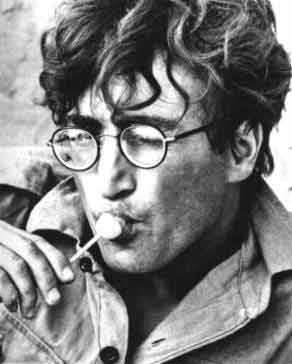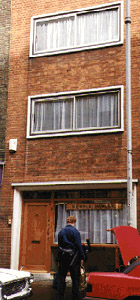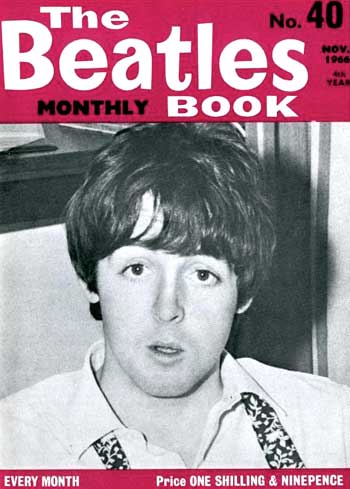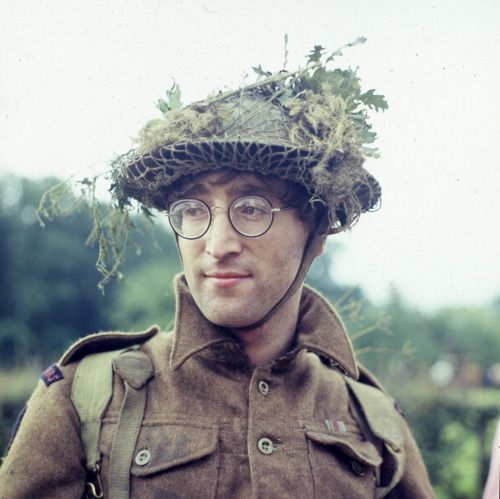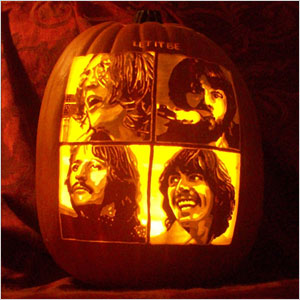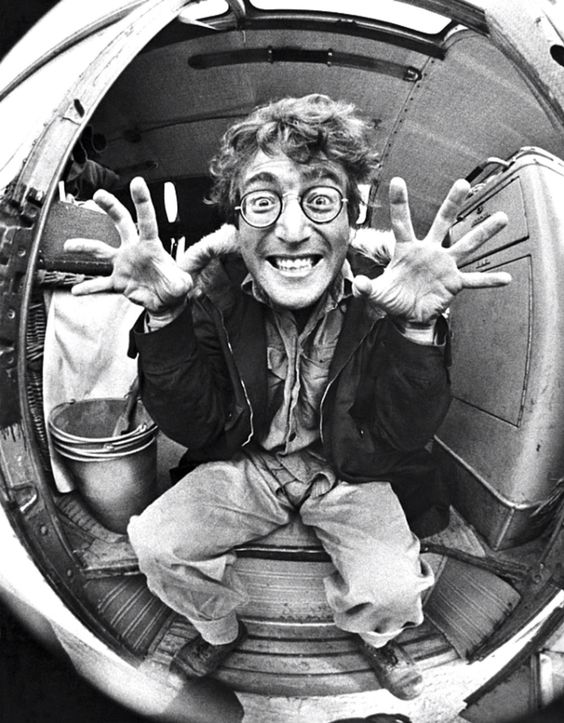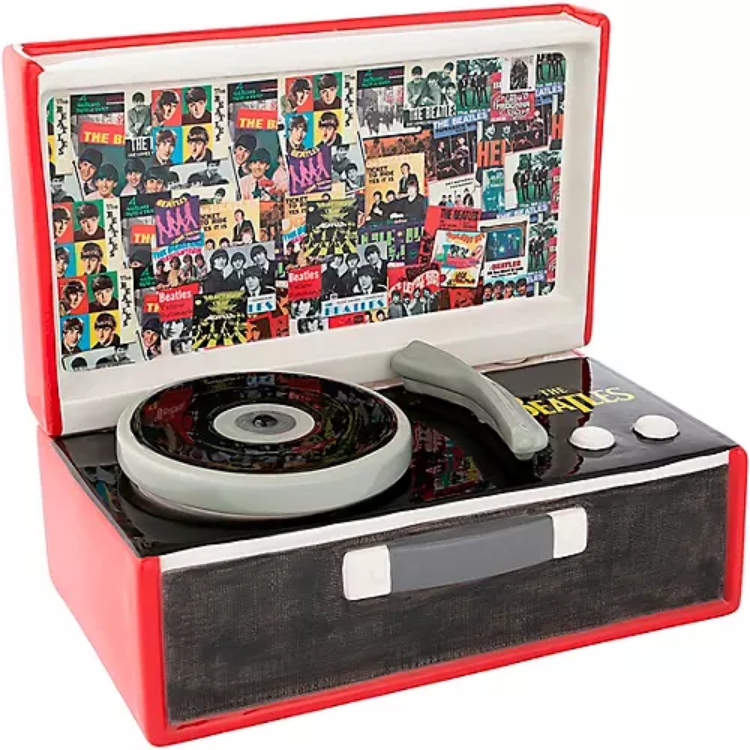On October 29th 1966, Fred Robbins met up with John Lennon in Carboneras, Spain for an interview conducted between takes, on-location during the filming of 'How I Won The War.'
John Lennon was chosen for the role by director Richard Lester who had directed Lennon previously in the Beatles' first two films, 'A Hard Day's Night' in 1964 and 'Help!' in 1965. Lennon makes it clear that he would not have taken on a movie role with any other director.
In this outdoor interview, with the sound of the wind in the microphone, Fred Robbins chatted with Lennon about songwriting, the darker side of the Beatles 1966 Tour, and cutting his hair short for the film role.
John Lennon would write the song 'Strawberry Fields Forever' in Spain during the filming of this movie. In addition to Carboneras, other Spanish locations chosen by Lester for shooting the film included Almeria and Andalucia.
Robbins was originally a television emcee in the 1950's, moving to work with Radio Luxembourg in the 1960's. He later would work for CNN before passing away in 1992.
Q: "Well, so our good friend John Lennon has been shorn. How does it feel?"
JOHN: "It feels quite comfortable out here, you know. It's not too short."
Q: "You look a little like Bob Dylan this way. Have you noticed it? Anybody else say that?"
JOHN: "I dunno. About two people have said it. It's because me hair's standing on end." (laughs)
Q: "It's very becoming, John. Honestly. I think it's easy to get used to, eh?"
JOHN: "It's quite easy to get used to. It's full of sand and old rubbish, you know."
Q: "Do you think it'll take long to grow it back?"
JOHN: "No. It looks quite normal at night when I comb it, if I can get my comb through it. You wouldn't know it wasn't just the back's short and no sideboards."
Q: "This surely must be one of the most unusual locations in the world. I wonder if you could describe it and tell us exactly where we are and what's going on here."
JOHN: "You're asking me where we are! (giggles) Well, as far as I know we're somewhere in Spain. It could be anywhere for all I know, actually. And it's just like, uhh... I dunno. It's like a dump, really. It's like the moon, you know -- just desert and sand and hills and mountains. They're not very nice to look at, but the weather is ok now and then."
Q: "Beautiful weather. What a perfect spot for this picture. This is supposed to represent what?"
JOHN: "North Africa, and I believe it's pretty similar."
Q: "First dramatic role, eh, John?"
JOHN: "Well, dramatic's a good word. (laughs) First ROLE, really. The others were just messing about.:
Q: "How do you take to it? How does it come to you?"
JOHN: "Well, sometimes it comes hard (laughs) and sometimes it comes easy. It depends on the day."
Q: "Do you like it? Do you find it's natural to be an actor?"
JOHN: "Some of it is natural. The most unnatural bits are hard, you know -- the ones that are REALLY out of character for me. It's alright, but it's not the be-all and end-all for me."
Q: "But you do like it? You'd like to do more of it?"
JOHN: "I think I'd do limited amounts of stuff, because I AM limited at what I could do."
Q: "You really don't know until you try."
JOHN: "No, I don't. But I don't want to be trying meself out in films. It's too public."
Q: "That's true. But did you know you could write before you wrote?"
JOHN: "I didn't think about it, because I was always writing, you see, just sort of naturally."
Q: "In other words, the acting thing is still a new thing for you... just trying your wings."
JOHN: "Yes, it's really trying me wings."
Q: "It'll be fascinating to see what happens. Can you tell me about your character? Who do you play?"
JOHN: "It's a Private soldier called Gripweed. He's not particularly nice. He's not TOO horrible, but he's just looking after himself all the time. That's the main thing."
Q: "And what relationship do you have to the other people in the film."
JOHN: "Well, none really. We don't really have much of a relationship. We're not fighting or anything. We don't, sort of, have a lot to say directly to each other. And... well, I'm Michael Crawford's batman. He's Officer Goodbody and I'm meant to look after him, you know. But I spend most of the time not looking after him and trying to dodge it."
Q: "Kind of mess things up a little bit."
JOHN: "Uhh, it's a bit like that."
Q: "That's a different connotation of the word batman. In America we have a television series..."
JOHN: (giggling) "Oh, I know. We got it in Britain, too."
Q: "But it really means an 'aid' here, or 'helper.'"
JOHN: "Oh yeah. That's just the usual Army term for the fella that crawls about, looking after the officer. You know, 'Yes sir, no sir, certainly sir.'"
Q: "And you're right here with your old buddy Dick Lester again."
JOHN: "Yes, yes. He's alright." (laughs)
Q: "He certainly established a style, with you fellas."
JOHN: "Yes, hasn't he."
Q: "I mean, the individuality of you guys, as well as his uniqueness as a director, it was a great marriage in both pictures so far, you know. I think it's exciting that he's directing you in your first role awway from the group."
JOHN: "Well, I wouldn't have accepted, probably, if it hadn't been him. I would've been too nervous. (giggling) You know, I can make a fool of meself in front of him because I know him. If it had been some other director saying 'Do this, and do that,' I would have fallen apart."
Q: "What does this character give you a chance to do, and in what light does it show you, as opposed to anything you've done in the past?"
JOHN: "It just IS completely opposed to anything I've done in the past. I'm just a different person in it, and I'm nothing like people have seen me before, really."
Q: "Is that why you took the part?"
JOHN: "I took it because I was interested in the film, and interested in trying me wings at something else. I felt like doing something for a change, and this just happened to come up at a time when I felt in that mood."
Q: "What generally does the film deal with... without giving away any of the plot."
JOHN: "It's very hard to generalize. (giggles) It's a strange film. It's just about these people in the war, together and not together."
Q: "A British squadron."
JOHN: "Yes. It could be ANY squadron. It could be any soldiers, anywhere."
Q: "Where have you been filming so far?"
JOHN: "We've been to Germany. We were there two weeks, filming on the NATO grounds. (monotone) Whoopie."
Q: (giggles)
JOHN: (giggling) "And then we came out here."
Q: "Does this mean that all of the boys are going to be trying different things as you go along, John?"
JOHN: "Well, I can't speak for the others, you know, but George has just got back from India -- TRYING India." (giggles)
Q: "I saw a picture of him with a mustache the other day, picking up that teacher of the sitar (Ravi Shankar) at London Airport."
JOHN: "Oh yeah. He traveled with him from India. That's his teacher."
Q: "He flipped over that instrument, didn't he."
JOHN: "Yeah. Well, that fellow that teaches him is one of the all-time greats, so he's lucky that the fella would accept him as a pupil. He doesn't just have anybody, you know."
Q: "Will you be using the sitar as a regular sound?"
JOHN: "The sitar just happens to have come in useful on a couple of tracks, but it's really nothing to do with it. That's George's own scene."
Q: "It won't be a part of the regular albums or records?"
JOHN: "No, unless it's called for."
Q: "When is it called for?"
JOHN: "I don't know. When you suddenly think, 'A sitar would be nice here.' George will obviously write more numbers with the sitars involved if he feels like it."
Q: "Where does the inspiration come from, or is it just craftsmanship? Can you just sit down at a given time and say 'We have to write now,' and out it comes?"
JOHN: "Well, sometimes it comes like that. Sometimes they say, 'Now you must write,' and now we write. But it doesn't come some days. We sit there for days just talking to each other, messing 'round not doing anything."
Q: "How was 'Michelle' written?"
JOHN: "Paul has had this idea about writing a bit with some other language, with French in it. And he just sort of had a bit of a verse, and a couple of words, and the idea. I think he had some other name or something. He used to talk Double-Dutch French, you see, just to sing the bit." (imitates singing mock-French)
Q: (giggles)
JOHN: "He just brought it along and just sort of started fiddling around trying to get a middle-eight. We pinched a little bit from somewhere and stuck it in the middle-eight, and off we went. Q: "What about 'Yesterday?'"
JOHN: "'Yesterday' is Paul completely on his own, really. We just helped finishing off the ribbons 'round it, you know -- tying it up."
Q: "I'm delighted to see that your last tour was such a smash, in view of the pressure you were under. I was thrilled that it came out as good as it did."
JOHN: (giggling) "I was pleased, meself."
Q: "It was such a ridiculous thing that happened on this experience that you had. I want to know, just to wrap this thing up, what kind of reflections you had on that whole thing, John."
JOHN: "Well, now it's just like a bad dream. It's just way in the back of my mind somewhere, and it just comes back when you read things, just odd things that crop up now and then -- 'Cardinal So-and-so says it's OK,' (laughs) or things like that. But it's really WAY in the back of my mind."
Q: "What frightening implications, a thing like that. It could happen to anybody, you know, not just famous people."
JOHN: "Yeah."
Q: "But what a frightening implication, when things like that can be used to hurt a person."
JOHN: "Yes, a pretty amazing scene, that was. It was VERY frightening."
Q: "It's really, you know, like the McCarthy era..."
JOHN: "Mmm. It's just certain things seem to whip up certain emotions, and at certain times as well."
Q: "When are you going to be doing another tour? Do you know?"
JOHN: "No idea. I know we got music to write, soon as we get back. And Paul's just signed us up to write the music for a film. So I suppose it's off the plane and into bed -- Knock knock knock, 'Get up and write some songs.'"
Q: "A film that's not your own?"
JOHN: "Yes."
Q: "Very exciting. So Burt Bacharach is going to have a little competition."
JOHN: (sighs comically) "It's about time, you know."
Q: (laughs) "I think you're right, John. Just finally now, what do you think the audience can expect from 'How I Won The War?' What have we got to look forward to? Aside from seeing John Lennon in his first dramatic role?"
JOHN: "Well, I mean, I'm incidental. The thing you've got to look forward to is seeing a great film, I hope. The way it's going it seems to be fine. And if it gets out and on the road, you know, it should be a great film."
Q: "One thing, they'll be able to see you with a peeled nose for the first time."
JOHN: (giggling) "Yeah, they'll get to see a lot of things for the first time."
Q: "It's exciting, John, and I'm delighted to talk to you again, in such a place that really does look like the moon. They told us it was dusty, and it IS dusty."
JOHN: "It is. You've come on a good day."
Q: "John, this new guise of yours, with the shorter hair... has it given you some kind of joy, some sadistic joy in the privacy you've been able to enjoy?"
JOHN: "Well you know, I went 'round the flea market and did all things I haven't done for a long time. It was great."
Q: "Nobody recognized you?"
JOHN: "Uhh, one or two people did double-takes, you know, but nobody knew at all. It was shorter than this, then."
Q: "They thought, 'What's Bob Dylan doing over here?'"
JOHN: "No, it didn't look like him, 'cuz I had it plastered down."
Q: "That's a sweet joy, isn't it, to be able to have a little privacy once in a while?"
JOHN: "Yeah, it was great. I was knocked out."
Q: "Have any of the guys ever resorted to disguises to be able to go someplace?"
JOHN: "Well, I just heard the other day that Paul was at someplace in London disguised as an Arab."
(laughter)
JOHN: (giggling) "I don't know whether it's true or not. But he used to say that was the only way he could really disguise himself, was as an Arab. But if he did, he got caught."
Q: "I don't think anybody will recognize George with his mustache now."
JOHN: "No, they got him, because they got him in India. There's one of those shots you can see -- they caught it going out of a door, and he had a mustache. And it just said, 'George Harrison In Disguise.' They still know your face. People that do know, spot your face even if you're wearing a pith helmet."
Q: "That's what happens I guess."
JOHN: "Mmm."
Q: "You'll never get away from it, John."
JOHN: "I'll smash me face in."
